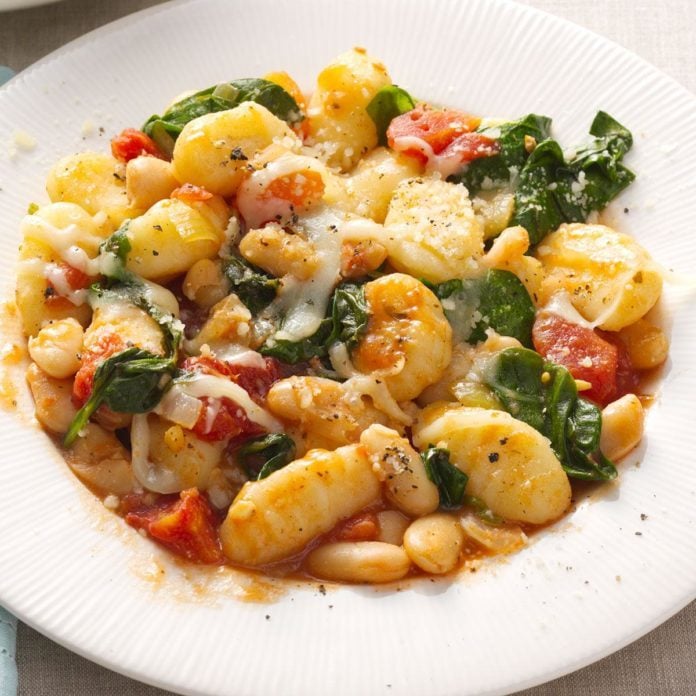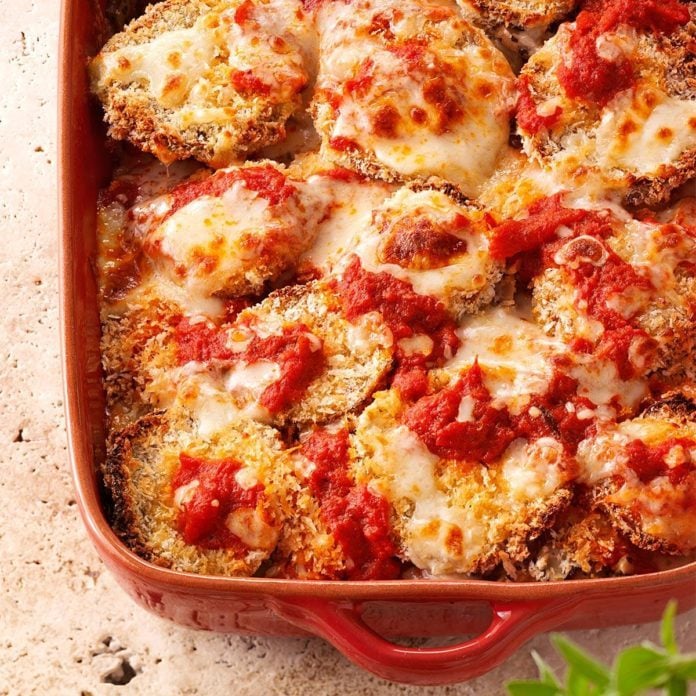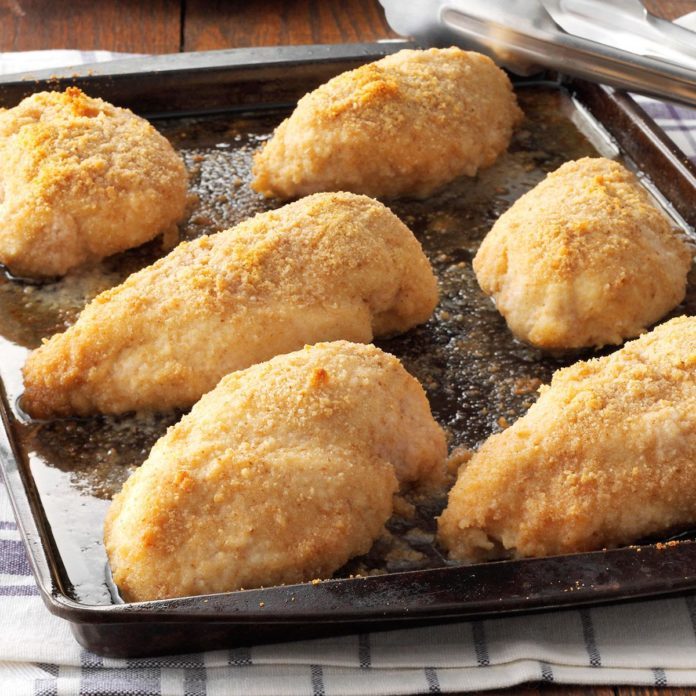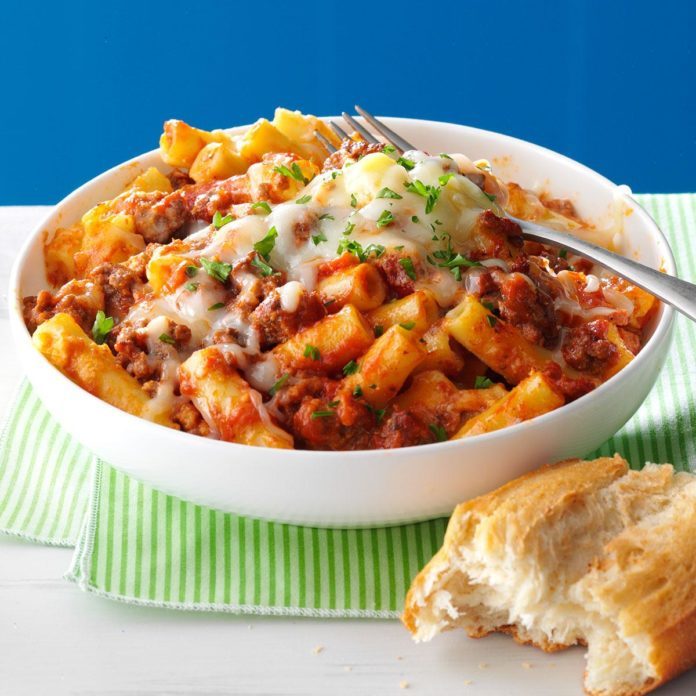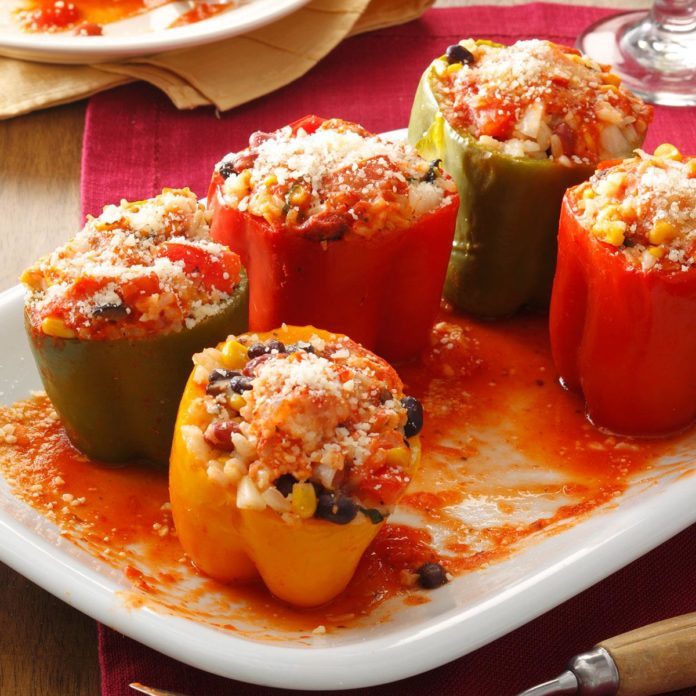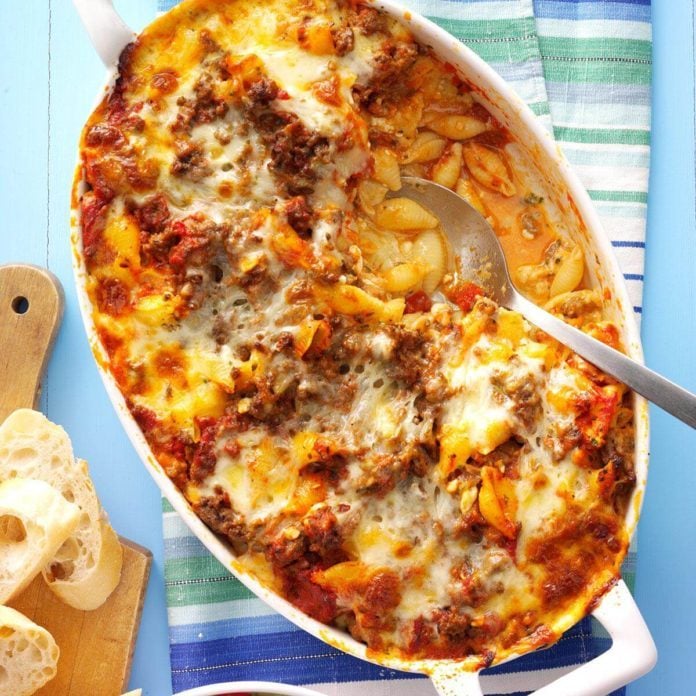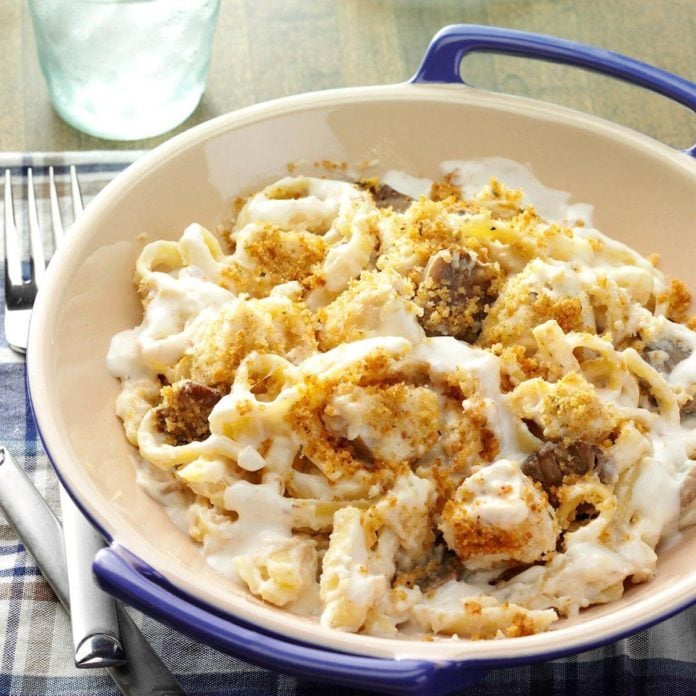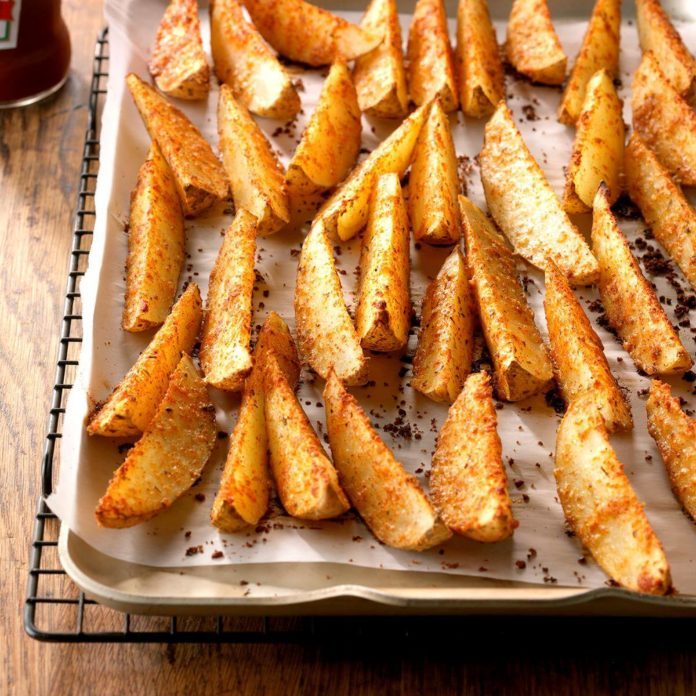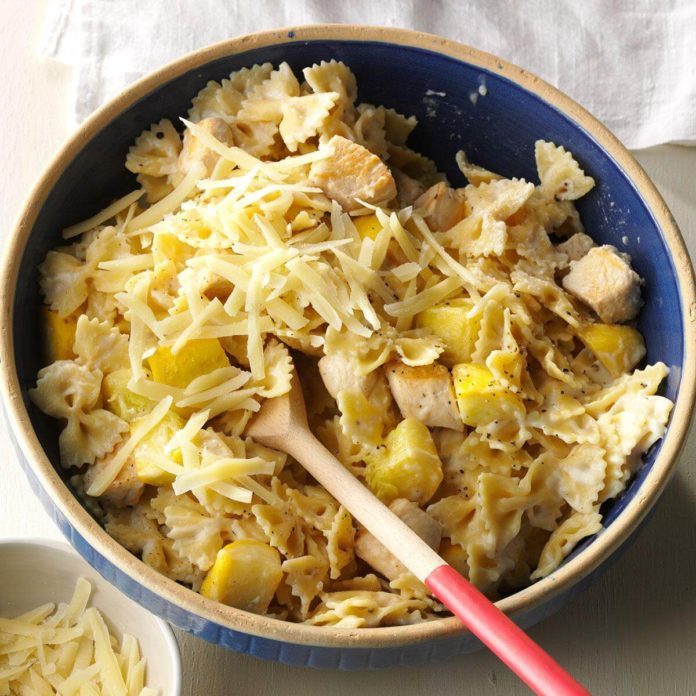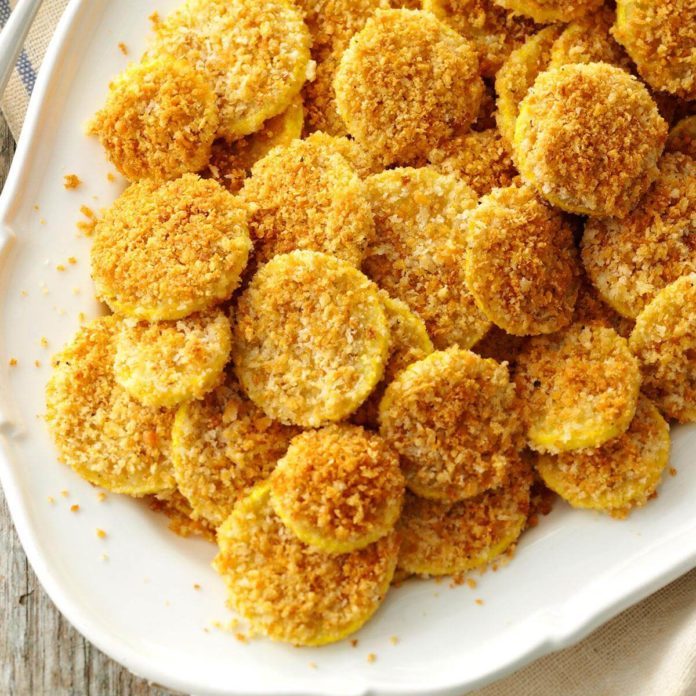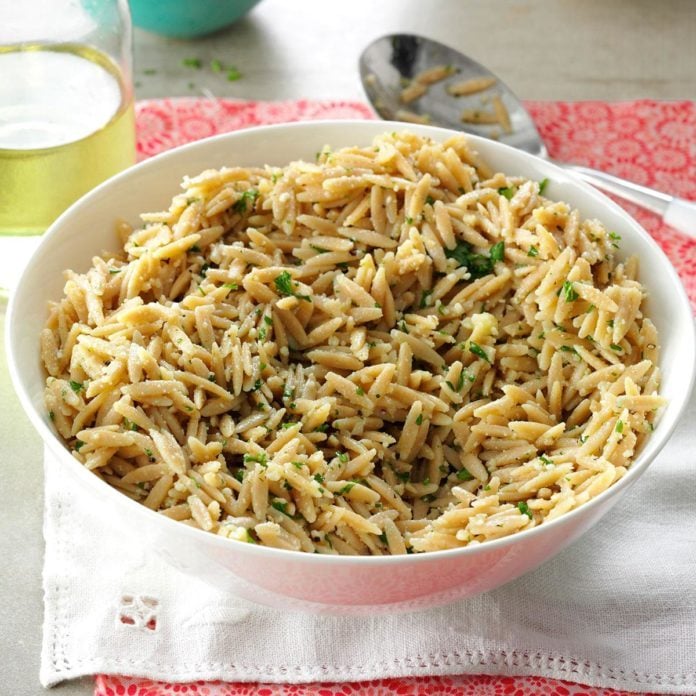I've been told by fellow party-goers that this recipe tastes exactly like a jalapeno popper. I like that it can be made without much fuss. —Ariane McAlpine, Penticton, British Columbia
Get Recipe
Every time that I make this cheesy baked spaghetti, I get requests for the recipe. It puts a different spin on pasta and is great for any meal. The leftovers, if there are any, also freeze well for a quick dinner later in the week. —Ruth Koberna, Brecksville, Ohio
Get Recipe
For special occasions (like my husband’s birthday dinners), I mash my potatoes with cream cheese, sour cream and Parmesan. It's divine comfort food. —Jo Ann Burrington, Osceola, Indiana
Get Recipe
Nothing could be more simple than this side dish. Since it has just four ingredients, I assemble it in no time, then pop it into the oven for about 15 minutes. It turns out perfect every time. —Mary Ann Marino, West Pittsburgh, Pennsylvania
Get Recipe
We enjoy serving this tasty chicken bruschetta to both family and to company. It just might become your new favorite way to use up summer tomatoes and basil. —Carolin Cattoi-Demkiw, Lethbridge, Alberta
Get Recipe
We get a lot of zucchini when it's in season. This is a good and different way to use the excess. —Lucia Johnson, Massena, New York
Get Recipe
This loaf has a rugged, textured look that adds to its old-fashioned appeal. The mild Parmesan flavor nicely complements the zucchini, which adds bits of green color to every tender slice. —Christine Wilson, Sellersville, Pennsylvania
Get Recipe
Here’s one of those no-fuss gnocchi recipes you can toss together and cook in one skillet. Ideal for a busy weeknight, it’s also good with crumbled Italian chicken sausage if you need to please meat lovers. —Julianne Meyers, Hinesville, Georgia
Get Recipe
Dijon, Parmesan and a hint of horseradish give this toasty fish from Scott Schmidtke of Chicago, Illinois lots of flavor. The preparation is so easy, it takes just 5 to 7 minutes to get 4 servings ready for the oven. —Scott Schmidtke, Chicago, Illinois
Get Recipe
You'll knock their socks off with this easy-to-prep side dish that's absolutely delicious. My favorite time to make it is when the zucchini is fresh out of the garden. —Sandi Guettler, Bay City, Michigan
Get Recipe
A coating containing cornflakes, Parmesan cheese and ranch dressing mix adds delectable flavor to the chicken pieces in this recipe and bakes to a pretty golden color. Ranch chicken is a mainstay main dish I can always count on. —Launa Shoemaker, Landrum, South Carolina
Get Recipe
Because my recipe calls for baking the eggplant instead of frying it, unlike most eggplant parmesan recipes, it’s much healthier! It takes a little extra time, but the Italian flavors and rustic elegance are well worth it. —Laci Hooten, McKinney, Texas
Get Recipe
The savory coating on this chicken has the satisfying flavor of Parmesan cheese. It's easy enough to be a family weekday meal yet impressive enough to serve to guests. When I make this chicken for dinner, we never have leftovers. -Schelby Thompson, Camden Wyoming, Delaware
Get Recipe
I enjoy making this ziti recipe for family and friends. It's easy to prepare, and I like to get creative with the sauce. Sometimes I might add my home-canned tomatoes, mushrooms or vegetables. —Elaine Anderson New Galilee, Pennsylvania
Get Recipe
Just thinking about this dish sparks my appetite. The ham and cheese rolled inside make for a tasty surprise. The chicken rolls are especially nice served over rice or pasta. —Jean Sherwood, Kenneth City, Florida
Get Recipe
These filling and flavorful peppers are an updated version of my mom's stuffed peppers, which were a favorite when I was growing up in upstate New York. Whenever I make them, I'm reminded of home. —Melissa McCabe, Long Beach, California
Get Recipe
Growing up, this was the meal I always wanted on my birthday. Mother made the sauce from scratch, but I use store-bought spaghetti sauce to save time. Replace the ground beef with Italian sausage if you want more spice. —Deb Morrison, Skiatook, Oklahoma
Get Recipe
It always amazed me that this simple recipe could make potatoes taste so good. Mom liked to make them for Easter because they were more special than ordinary baked potatoes. —Ruth Seitz, Columbus Junction, Iowa
Get Recipe
As a cattle rancher, my husband's a big fan of beef. For him to comment on a poultry dish is rare. But he always tells me, "I love this casserole!" I first tasted it at a potluck; now, I fix it for my family (we have a 3-year-old daughter) once or twice a month, and I'm asked to take it to most every get-together. —Rochelle Brownlee, Big Timber, Montana
Get Recipe
My husband had a poor perception of healthy food until he tried this beefy casserole. The combination of pasta, oregano, mushrooms and green peppers make it a favorite in our house. —Theresa Smith, Sheboygan, Wisconsin
Get Recipe
For a big hearty meal, I make this recipe as a side dish to go with veal cutlets or a roast. But you could also serve the beefy lasagna as a main dish. Just pair it with a tossed green salad and loaf of garlic bread. —Patricia Collins, Imbler, Oregon
Get Recipe
I've made this bacon, cream and Parmesan cheese pasta sauce for so many years and have always called it a carbonara. Low-and-behold, I recently found out it's actually more like an Alfredo sauce. In either case, it's absolutely heavenly and a great option for company! —Cathy Croyle, Davidsville, Pennsylvania
Get Recipe
You won’t have to fish for compliments when this is the catch of the day! Christi McElroy — Neenah, Wisconsin
Get Recipe
I recommend serving these wedges alongside a salad for a light lunch or serving them as a side dish with a chicken or beef entree. —Beth Ask, Ulster, Pennsylvania
Get Recipe
My husband and I avoid fried foods, but potatoes are part of our menu almost every day. These delectable sliced potatoes get nice and crispy and give our meals a likable lift. —Mary Lou Kelly, Scottdale, Pennsylvania
Get Recipe
Coat tender chicken breasts with seasoned bread crumbs and smother in marinara sauce. Served on a hoagie, it’s a real treat! —Sue Bosek, Whittier, California
Get Recipe
I began making this creamy side dish years ago as a way to get my kids to eat broccoli. They've since grown up, but still request this satisfying dish. It's truly a family favorite. —Barbara Uhl, Wesley Chapel, Florida
Get Recipe
These tender breadsticks fill the kitchen with a tempting aroma when they are baking, and they're wonderful served warm. My family tells me I can't make them too often.
Get Recipe
I couldn’t shake my mashed potato habit, until I tried mashed cauliflower with a similar consistency. I started making my own, and my family loves it. —Meredith Howard, Franklin, Kentucky
Get Recipe
On lazy summer weekends, we like chicken and yellow squash tossed with bow tie pasta. Add extra fresh grated Parmesan for a Sunday touch. —Sarah Smiley, Bangor, Maine
Get Recipe
Here's one of the best pork medallion recipes I've found. With my own special tweaks, I have served this tender pork countless times for family and friends. It takes very little prep time and adapts easily to serve any number. —Angela Ciocca, Saltsburg, Pennsylvania
Get Recipe
I've liked the chicken and artichoke combo for a long time. Here's my own lemony twist. With all the praise it gets, this dinner is so much fun to serve. —Carly Giles, Hoquiam, Washington
Get Recipe
Sure, it’s simple and healthy but, oh, is this roasted broccoli delicious. Cutting the stalks into tall “trees” turns an ordinary veggie into a standout side dish. —Holly Sander, Lake Mary, Florida
Get Recipe
My creamy, comforting side dish wonderfully rounds out any holiday dinner. Just a little of this rich casserole goes a long way. —Jennifer Bley, Austin, Texas
Get Recipe
Baked yellow squash is beautifully crispy. You don’t have to turn the pieces, but do keep an eye on them. — Debi Mitchell, Flower Mound, Texas
Get Recipe
My grandsons rave over these creamy potatoes loaded with Parmesan. That’s all the endorsement I need. Sometimes I use golden or red potatoes, with skins on. —Kallee Krong-McCreery, Escondido, California
Get Recipe
A colorful mixture of peppers and green beans gets an Italian treatment with basil and Parmesan cheese in this delightful vegetable dish. The garlic adds a savory zip. —Marian Platt, Sequim, Washington
Get Recipe
This cheese bowl salad looks impressive but is a cinch to make. I won't tell if you don't! —Melissa Wilkes, St. Augustine, Florida
Get Recipe
I like the challenge of inventing recipes with ingredients I have on hand. This easy-peasy meal fits the bill. —Colleen Doucette, Truro, Nova Scotia
Get Recipe
Shredded Parmesan gives these chops a really nice and rich coating that's easy to work with and so, so good. —Hayden Hosick, Corona, California
Get Recipe
I wanted a healthier approach to fish sticks and developed a baked tilapia with a slightly peppery bite. My husband and sons love the crispy coating. —Candy Summerhill, Alexander, Arkansas
Get Recipe
Mom taught me this easy recipe, which is perfect for feeding a crowd. There is never a crumb left over. Mom used her own bread dough, but using frozen dough is my shortcut. I make a wheat bread dough version with poppy and sesame seeds that’s popular, too. —Trisha Kruse, Eagle, Idaho
Get Recipe
A splash of lemon and shower of chopped parsley brighten this orzo, one of my family's most requested springtime sides. It's fantastic with chicken, pork and fish, or you can eat it on its own as light lunch. —Leslie Palmer, Swampscott, Massachusetts
Get Recipe
Whether you need a quick gift idea or yummy munchies for movie night, we've got you covered with this cheesy twist on regular popped popcorn. —Taste of Home Test Kitchen
Get Recipe
We like to eat raw vegetables a few times a week as a side dish for a meal and this is a healthier alternative to ranch dressing for a veggie dip. —Kathleen Tribble, Buellton, California
Get Recipe
My family loves pasta! This simple dish is always a hit, especially during the spring when sugar snap peas are the sweetest. To keep us from getting in a rut, I change up the flavors. —Crystal Jo Bruns, Iliff, Colorado
Get Recipe
My easy tartlets loaded with a cheesy mushroom filling take advantage of refrigerated crescent roll dough. I think they’re best warm from the oven with a sprinkling of green onion.—Betsy King, Duluth, Minnesota
Get Recipe
This rich and creamy spinach dish takes minutes to make. If I'm expecting guests, I'll double or triple the recipe. —Leann Ross, San Tan Valley, Arizona
Get Recipe
A dear friend and I wanted to make an easy apple crisp. We made a Parmesan filling, stuffed the apples and baked them whole. They were a hit! —Susan Stetzel, Gainesville, New York
Get Recipe
Pairs wedges of this chewy flatbread with a tomato-based soup and start dunking! —Cynthia M. Bent, Newark, DE
Get Recipe







